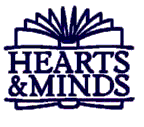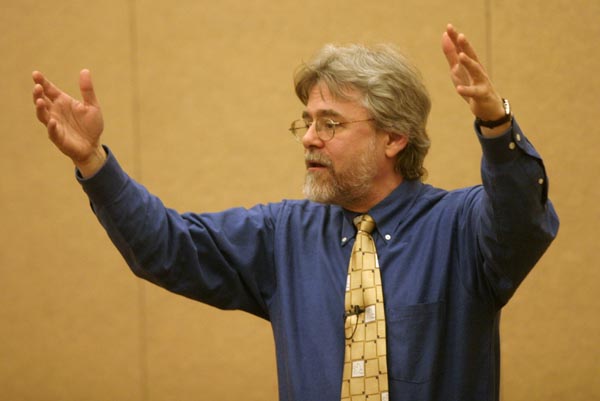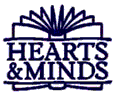John Haught, mainline Protestants, and the Science of Intelligent Design

And so I give this report from one of the several places we’ve been in the last week. Every year, the prestigious Pine Street Presbyterian Church in Harrisburg offers to the Central Pennsylvania community what they call their Winter Seminar. It is nearly always a person of great note---from Marcus Borg to Phyllis Tickle, Walter Brueggemann to Jack Rogers. We have been privileged to sell books at these important events, and their gift of hosting important speakers which represent the best of mainline, liberal Protestantism, and the nice hospitality they offer—to the speakers, the guests, and to us from the bookstore---is always a pleasure to behold. As those that know us well may imagine, we are both happy to offer resources to our fellow Presbyterian (USA) friends, and eager to hear these speakers from a theological tradition that is not precisely our own, and, yet, we come away deeply ambivalent. As an evangelical with high regard for traditional orthodoxy, it is always perplexing to me how leaders in the Protestant mainline can re-invent doctrinal views that have held for centuries, as if they are re-formulating a minor matter. And yet, I find the spiritual openness and genuine sense of fidelity and doxology, at least at Pine Street, to be inspiring and interesting. I may be more provoked than some who attend these kinds of events but there are none more gratified for being nurtured into a provocative faith. We enjoy our ecumenical partners, and especially enjoy our friends in Harrisburg.
And so, this year, the Winter Seminar lecturer was the very informative, wonderfully humble, excellent communicator and world-renowned Catholic theologian, Dr. John Haught. Dr. Haught is known as a creative thinker, informed much by Pierre Teilhard de Chardin and the subsequent liberal process theologians, yet remaining largely orthodox within a broadly Catholic framework and is an expert on theistic evolution. His work on faith and science at the Georgetown Center for the Study of Science and Religion is renowned, and it was an honor to meet him, a delight to hear him, and we were happy to sell a bunch of his books, the rigorous ones, such as God After Darwin: A Theology of Evolution (Westview; $29.99) and the more introductory ones, such as Responses to 101 Questions About God and Evolution (Paulist; $12.99.) I thank the team at Pine Street for again allowing us to add a bit of value to their good event by displaying such a wide variety of books.
But (and I hope you knew this was coming) I would have wished that Dr. Haught would have spent a bit more time explaining his critique of Intelligent Design. He was, after all, the star witness of the ACLU’s case against the Dover School Board (near us, here) that ruled against reading a short statement saying that that Darwinist views of evolution are contested, and other views can be found in the school library. (Gadzooks, no! We can’t tell kids that there are different views out there, for heaven’s sake. Not in a science class of all places! Yikes! Call the cops!) That the good Dr. Haught caricatured the ID case was evident to the few of use in the room that cared about such things. That nobody but one (a friend I brought) asked even anything approximating a hard question gave me pause. Why, in mainline liberal circles, are the audiences so docile, so agreeable to anything that hammers the conservatives? (It was the same way when Borg denied the bodily resurrection a few years back, an event after which I came back, counted our money, and cried. Nobody, and I mean nobody, raised an eyebrow, let alone a hand in comment!)
To wit: I recommend Dr. Haught’s books where he takes the time to explore matters in greater detail. There are many theistic evolutionists out there, and he is one of the more thoughtful ones (despite the fascination with Chardin’s rather goofy Omega Point evolution of the cosmos stuff.) For instance, see his Deeper Than Darwin: The Prospect of Religion in an Age of Evolution (Westview; $24.99.) This seriously illustrates his mature critique of naturalism and the ways in which religious faith can illustrate deeper truths about the universe than can a dogmatic and reductionistic Darwinism.
Still, despite his vivid critique of secular naturalistic ideology which undergirds much of the mainstream of science these days, and the confusion in many popular writings between science and the philosophy of science, he continual fell back into the typical framing of the matter as if it is a contest between religion and science, rather than different worldviews and presuppositions which lead to different philosophies of science. He admitted that there is never a pure science since all human theorizing is colored by the worldviewish convictions of the scientists (think of Kuhn and Polanyi, at least, Kuyper and Dooyeweerd if you can, and Roy Clouser’s, Myth of Religious Neutrality if you haven’t.) And yet, having admitted to that, he fell back time and again into talking about “Science” (as if that was a neutral given, as if all true scientists agreed on a particular worldview) and “faith” (as in “over and against science.”) That a Ph.D. and world-renowned theologian who works in this field hasn’t quite rooted this dualistic and unhelpful framework from his approach was frustrating; Oh, how I wish I could have him, and those listening and nodding in approval, read the last chapter of Creation Regained: The Biblical Basics for a Reformational Worldview where Al Wolter’s gives us the “structure and direction” insight about not confusing the worldviewish and philosophical direction of a sphere's unfolding with the sphere itself. Or, to get at it a different way, how I wish non-evangelicals who seem unware of this important body of work, would grapple with the history of the fact/value split as illustrated and explained by Nancy Pearcey in Total Truth: Liberating Christianity From It's Cultural Captivity that gets at the root of the rise of this odd way of talking about truth and religion, as if public truth (science) and private, subjective truth (religion) were two different things. Leslie Newbegin similiarly ponders that, but Pearcey is the one to read first.
To make the point that Dr. Haught’s testimony at the famous Dover trial can be contested, and the Judge’s rulings were roundly illogical, despite what Professor Haught casually asserted, I would recommend these three resources. What is plain is that very, very smart folks have huge, huge disagreements with the Darwinist hegemony, and that Dr. Haught’s Harrisburg lectures, as pleasant and appealing as they were, clearly only skimmed the surface of what is surely one of the most important controversies of our time. For another view, please call us and order one or all of these:
Traipsing Into Evolution: Intelligent Design and the Kitzmiller vs Dover Decision David Dewolf, John West, Casey Luskin and Jonathan Witt (Discovery Institute) $14.99 This is a must-read for anyone interested in the case, the legalities of the matter of the most reasonable definitions of science, religion, etc. A rare book, we are delighted to stock it, even though nobody much cares. It really is a very interesting read, though, and important.
Darwin Strikes Back: Defending the Science of Intelligent Design Thomas Woodward (Baker) $14.99
 One reviewer wrote, “The controversy over Darwinism and ID signals a major scientific and social revolution. Everyone who wants to understand it should read this timely and well-written book.” Michael Behe writes on the back “Talking the reader behind the headlines, Woodward---the premier historian of the ID movement---analyses crucial developments of the past decade.”
One reviewer wrote, “The controversy over Darwinism and ID signals a major scientific and social revolution. Everyone who wants to understand it should read this timely and well-written book.” Michael Behe writes on the back “Talking the reader behind the headlines, Woodward---the premier historian of the ID movement---analyses crucial developments of the past decade.”Bill Dembski writes in the foreword:
…It is fitting that (I met Woodward) at a lecture by Alvin Plantinga, since Plantinga is not just one of the most highly regarded philosophers of our era; he is also one who has written sympathetically about the intellectual project of Intelligent Design. In this context, he can be viewed as a symbol of the spiraling rhetorical nightmare faced by neo-Darwinism in the high university world. The nightmare is not simply the result of political pressure that Darwinists are experiencing. Rather it is that the Darwinian account of evolution on which they are pinning their hopes is imploding.Woodward himself makes a good point in his introduction:
We have moved light-years beyond the stereotyped Inherit the Wind clash between dogmatic religion and enlightened science, which etched a fictional rendering of the Scopes trial onto our consciousness. Now it's no longer William Jennings Bryan against Clarence Darrow---it's no longer religion versus science. Today it is ID biochemist Michael Behe of Lehigh University versus Kenneth Miller, Darwinian biologist at Brown University. Now it is ID theorist Scott Minnich, who teaches microbiology at the University of Idaho and publishes his research on the flagellum, engaged in intense discussion with Robert Pennock, a Darwinian philosophy professor who teaches at Michigan State and has published critiques of ID. Whether anyone likes it or not, it is no longer science versus religion, it is now science versus science.The Design Revolution: Answering the Toughest Questions About Intelligent Design William A. Dembski (IVP) $16.00 This paperback price is a great buy given how much is packed into this dense 300+ page volume. Dembski responds to all the basic questions, the critic's accusations and the claims of those who think the ID movement unacceptable. He writes clearly and at some length. Read it for yourself, especially if you are taken with some of the popular level critique.
Science & Grace: God’s Reign in the Natural Sciences Tim Morris & Don Petcher (Crossway) $17.99
 Not an ID book, but a great example of how to back up, get the big picture, taking the best Biblical hermeneutics and the best philosophy of science, in light of Christian truth claims and thoughtful wholistic engagement with contemporary philosophy to come up with a radically Christian perspective on science. Morris spoke at Jubilee this past year (see last week’s posts) and we were duly impressed. One reviewer called it “an extraordinarily important book filled with paradigm shifting ideas.”
Not an ID book, but a great example of how to back up, get the big picture, taking the best Biblical hermeneutics and the best philosophy of science, in light of Christian truth claims and thoughtful wholistic engagement with contemporary philosophy to come up with a radically Christian perspective on science. Morris spoke at Jubilee this past year (see last week’s posts) and we were duly impressed. One reviewer called it “an extraordinarily important book filled with paradigm shifting ideas.”If one were to read up on the sciences, seeking a solid, Christ-honoring, Biblically-informed and reformationally-rooted vision of the high calling and limits of science in God’s world, one could hardly do better than Science & Grace. This is the kind of foundational book we should be reading even as we engage the broad cosmological questions of Teilhard or the details of educational policy as misunderstood by Judge Jones. I sure hope our BookNotes readers agree---this is an important matter to think through, and most of us simply haven't read much on either side. The journalists and judges, and, sadly, theologians and preachers, too often, haven't either. Might we challenge you to dig in this year, and read up in this arena?
any book mentioned in this post
25% off
read@heartsandmindsbooks.com 717.246.3333





<< Home